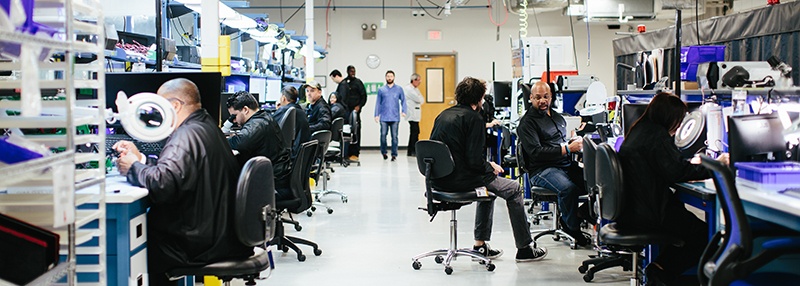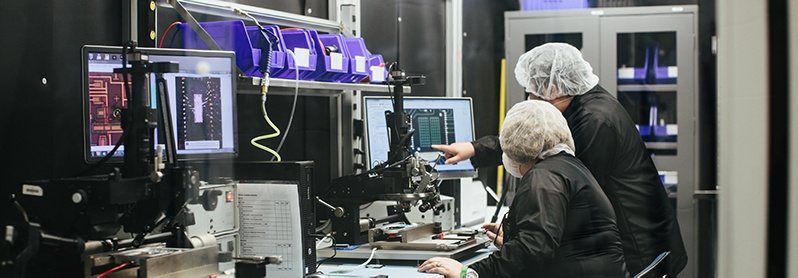All companies, and particularly those in information technology, face the challenge of finding talent for growth in an ever-tightening labor market. Smaller, newer players like Luminar, a six-year-old manufacturer of LiDAR-based sensors for vehicles, have to woo the best of the best away from brand-name behemoths.
“We’re competing for people who could go to the Googles and Facebooks,” says co-founder and CTO Jason Eichenholz. “So what we say is, here at Luminar you’re going to get more and broader experience than you ever would in one of those companies. There, you’ll be put in your silo and you’ll know only about what you do. Here, you’re going to get that breadth and depth of experience.” He adds that the company enjoys “an unfair advantage over other companies because of where we are geographically.”

Luminar’s research and development team in Orlando
He’s not referring to Luminar’s headquarters in the heart of Silicon Valley, but rather the company’s offices in a research park in Orlando’s tech corridor, where developments in optics, photonics and laser technology have advanced far beyond other regions. “It’s one of the best-kept secrets,” says Eichenholz, who has worked in the area since 1993. He hasn’t had a difficult time luring workers away from his competitors and finding the expertise the company needs to fill out its talent pipeline. “Over the course of the last three years, we’ve added and created a team with about a millennia of man- and woman- years of experience doing what we do,” he says.
In the early days, when the company was still making a name for itself, Eichenholz would sweeten offers by including something even Google could not match: one-year family passes to the area’s world-renowned theme parks. “That was a pretty big investment, but people really liked it,” he says. “It sent the message that we wanted the family to be happy, for it to be a family move. Also that, as a company, we want there to be work-life balance.”
Today, Luminar is competitive enough that it no longer needs to invest thousands in theme park passes. But the Florida sunshine and greater affordability still appeal to potential recruits, particularly those in the later stages of their careers. “They don’t necessarily like living in a small apartment in the Bay Area, but they can’t afford to buy a house there. They’ve been priced out. The quality of life here is very interesting to them.”
The company also tries to maintain the feel of a startup by “as we call it, bringing a little Silicon Valley to Orlando.” Perks include competitive pay and great benefits, high-energy snacks and smoothies on site and a catered lunch for all employees every day of the week. “When you’re feeding 120 people at lunch time in a room that was never designed for that many, it encourages cross-department communication. It creates a buzz in the building,” he says. “So for candidates visiting, they can literally feel the energy within the building from the second they walk in.”

Luminar brings the next generation of employees through campus on a regular basis via partnerships with local schools, which is one of the corridor’s benefits for employers looking to hire the right expertise. “We have more than 500,000 college students within a 100-mile radius around downtown Orlando,” adds Tim Giuliani, president and CEO of the Orlando Economic Partnership.
Located a stone’s throw from University of Central Florida, the second-largest in the country, Luminar has been able to establish internship programs that very often lead to permanent hires. Eichenholz is a courtesy faculty member with UCF’s College of Optics and Photonics, known as CREOL. “I know the professors personally so we can find the good ones early,” he notes.
That access to great people will be critical for Luminar’s next phase of maturity—ramping up scale in manufacturing. “The first phase was hiring all the laser physicists and electro optical engineers who have been doing this for decades,” says Eichenholz. “Now we’re bringing in the team that can bring millions of product units to market.” He adds that, with millions being spent on infrastructure in Orlando, a new performing arts center being built, and the city’s ranking as one of the highest job growth in the nation, the question of “why Orlando?” is more easily answered. “There’s a really strong story now,” he says, “and we’re telling it.”
Originally published in Chief Executive Magazine on April 11, 2018.
